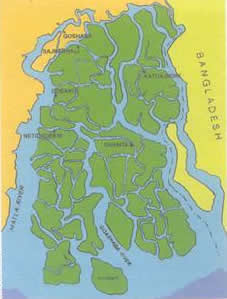-Shivani Thakur
The Sunderbans or Sunderban islands formed on the delta of two great Indian rivers, the Brahmputra and the Ganges have been declared as the World Heritage Site. These forests mainly consist of mangrove trees. All over the world mangrove
trees are found at the deltas of many great rivers. But the mangrove forests of India deserve a special mention, as they are the largest to be found any where in the world. The mangrove forests, swamps ad forest islands cover an area approximately of 1330.10
sq kms.
 The Sunderbans get their name from sundari trees once found in abundance in this area. In April and May the flaming red leaves of genwa trees edge the emerald island. The crab like red flowers of the kankara and yellow blooms
of khalsi form a dazzling display. The sunderbans are also the abode of the Royal Bengal Tiger. The tigers have adapted extremely well to the saline and aqua environs and are good swimmers too. The other species of animals found are chital deer, rhesus monkey
and much variety of fish, red fiddler crabs and hermit crabs. The sunderbans are also home to king cobra, rock python and water monitor. The endangered river terrapin, batagur baska is found on Mechua beach while the famous barking deer is found in Haliday
Island . The Sajnakhali sanctuary is famous for its rich avian population with species ranging from kingfisher, white bellied sea eagle and lapwings to sandpipers.
The Sunderbans get their name from sundari trees once found in abundance in this area. In April and May the flaming red leaves of genwa trees edge the emerald island. The crab like red flowers of the kankara and yellow blooms
of khalsi form a dazzling display. The sunderbans are also the abode of the Royal Bengal Tiger. The tigers have adapted extremely well to the saline and aqua environs and are good swimmers too. The other species of animals found are chital deer, rhesus monkey
and much variety of fish, red fiddler crabs and hermit crabs. The sunderbans are also home to king cobra, rock python and water monitor. The endangered river terrapin, batagur baska is found on Mechua beach while the famous barking deer is found in Haliday
Island . The Sajnakhali sanctuary is famous for its rich avian population with species ranging from kingfisher, white bellied sea eagle and lapwings to sandpipers.
Mangrove forests are most species rich eco-systems but are now threatened. They protect the coasts from storms and floods. Their roots stabilize the banks thus preventing soil erosion. But now scientists believe that changes occurring
are due to combined impact of global warming and unplanned human intervention. The rise in sea levels due to global warming could result in submergence of the sunderbans. The forests form a natural embankment against the vagaries of the sea. The global warming
is largely due to human emissions of greenhouse gases from a growing fossil fuel economy. According to Prof.Sugato Hazra, department of Oceanography, Jadavpur University sea surface temperature is increasing at .019 degree centigrade per year. Indications
like salination of estuaries and the soil, loss of bio diversity are all indicative of a stressed ecosystem. The effects of climate change are also visible in the plant and animal kingdom. Dr.Abhijit Mitra at department of Marine Science, Kolkata University
has found that 29 species of marine origin have entered sunderbans indicating that salinity has increased a lot.
The Tsunami of Dec 2004 struck many countries in South East Asia . Many villages on the coasts were saved due to these forests or suffered only partial damage. Their loss would result in more tsunamis and storms affecting not only
the human population but also the loss of a rich and abundant ecosystem.
( Map not to scale- courtesy WWF-India Newsletter dated March 2001)
-------------------------------------------------------------------------------------------------------
“There are 54 islands which are not there even on the map of India . They are almost washed away every time the sea rises. We have a mini tsunami every week. My focus has been over education on the islands. I believe education is
the future of India . In Sunderbans it has been all uphill. The kids are in the hands of a mafia. They carry alcohol every night to the ship and get Rs.50 for a night's work. And this little amount is what stands between survival and starvation for them. So
for them to come to school, I have to give them 50 rupees. I intend to start 15 schools with computer workshops with English as one of the subjects for the most deprived children. Each school needs some 50,000 dollars. I raise the money through royalties from
my books, through generous readers, through well wishers of people as far away as Italy , Spain . And of course, Kolkata.”
-Dominique Lapierre in The Hindu dated 23 Feb 2006